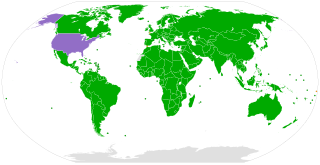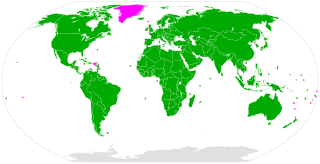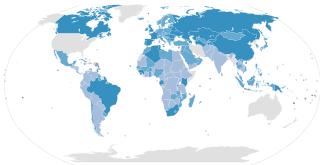| C150 | |
|---|---|
| ILO Convention | |
| Date of adoption | June 26, 1978 |
| Date in force | October 11, 1980 |
| Classification | Labour Administration |
| Subject | Labour Administration and Inspection |
| Previous | Nursing Personnel Convention, 1977 |
| Next | Labour Relations (Public Service) Convention, 1978 |
Labour Administration Convention, 1978 is an International Labour Organization Convention.
It was established in 1978, with the preamble stating:
Having decided upon the adoption of certain proposals with regard to labour administration: role, functions and organisation, ...
As of 2023, the convention has been ratified by 78 states.
| Country | Date | Status |
|---|---|---|
| Albania | 24 Jul 2002 | In Force |
| Algeria | 26 Jan 1984 | In Force |
| Antigua and Barbuda | 16 Sep 2002 | In Force |
| Argentina | 20 Feb 2004 | In Force |
| Armenia | 18 May 2005 | In Force |
| Australia | 10 Sep 1985 | In Force |
| Belarus | 15 Sep 1993 | In Force |
| Belgium | 21 Oct 2011 | In Force |
| Belize | 06 Mar 2000 | In Force |
| Benin | 11 Jun 2001 | In Force |
| Burkina Faso | 03 Apr 1980 | In Force |
| Cambodia | 23 Aug 1999 | In Force |
| Central African Republic | 05 Jun 2006 | In Force |
| China | 07 Mar 2002 | In Force |
| Congo | 24 Jun 1986 | In Force |
| Costa Rica | 25 Sep 1984 | In Force |
| Cuba | 29 Dec 1980 | In Force |
| Cyprus | 06 Jul 1981 | In Force |
| Czech Republic | 09 Oct 2000 | In Force |
| Democratic Republic of Congo | 03 Apr 1987 | In Force |
| Denmark | 05 Jun 1981 | In Force |
| Dominica | 26 Jul 2004 | In Force |
| Dominican Republic | 15 Jun 1999 | In Force |
| Egypt | 05 Dec 1991 | In Force |
| El Salvador | 02 Feb 2001 | In Force |
| Finland | 25 Feb 1980 | In Force |
| Gabon | 11 Oct 1979 | In Force |
| Germany | 26 Feb 1981 | In Force |
| Ghana | 27 May 1986 | In Force |
| Greece | 31 Jul 1985 | In Force |
| Guinea | 08 Jun 1982 | In Force |
| Guyana | 10 Jan 1983 | In Force |
| Iraq | 10 Jul 1980 | In Force |
| Israel | 07 Dec 1979 | In Force |
| Italy | 28 Feb 1985 | In Force |
| Ivory Coast | 01 Apr 2016 | In Force |
| Jamaica | 04 Jun 1984 | In Force |
| Jordan | 10 Jul 2003 | In Force |
| Kyrgyzstan | 22 Dec 2003 | In Force |
| Latvia | 08 Mar 1993 | In Force |
| Lebanon | 04 Apr 2005 | In Force |
| Lesotho | 14 Jun 2001 | In Force |
| Liberia | 02 Jun 2003 | In Force |
| Liberia | 02 Jun 2003 | In Force |
| Luxembourg | 21 Mar 2001 | In Force |
| Malawi | 19 Nov 1999 | In Force |
| Mali | 23 Jan 2008 | In Force |
| Mauritius | 05 Apr 2004 | In Force |
| Mexico | 10 Feb 1982 | In Force |

The United Nations Convention on the Rights of the Child is an international human rights treaty which sets out the civil, political, economic, social, health and cultural rights of children. The convention defines a child as any human being under the age of eighteen, unless the age of majority is attained earlier under national legislation.

The Convention Concerning the Prohibition and Immediate Action for the Elimination of the Worst Forms of Child Labour, known in short as the Worst Forms of Child Labour Convention, was adopted by the International Labour Organization (ILO) in 1999 as ILO Convention No 182. It is one of eight ILO fundamental conventions.
The Protocol to Prevent, Suppress and Punish Trafficking in Persons, Especially Women and Children is a protocol to the United Nations Convention Against Transnational Organized Crime. It is one of the three Palermo protocols, the others being the Protocol Against the Smuggling of Migrants by Land, Sea and Air and the Protocol Against the Illicit Manufacturing of and Trafficking in Firearms.

The ILO Convention Concerning Minimum Age for Admission to Employment C138, is a convention adopted in 1973 by the International Labour Organization. It requires ratifying states to pursue a national policy designed to ensure the effective abolition of child labour and to raise progressively the minimum age for admission to employment or work. It is one of eight ILO fundamental conventions. Convention C138 replaces several similar ILO conventions in specific fields of labour.

The Forced Labour Convention, the full title of which is the Convention Concerning Forced or Compulsory Labour, 1930 (No.29), is one of eight ILO fundamental conventions of the International Labour Organization. Its object and purpose is to suppress the use of forced labour in all its forms irrespective of the nature of the work or the sector of activity in which it may be performed. The Convention defines forced labour as "all work or service which is exacted from any person under the menace of any penalty and for which the said person has not offered himself voluntarily", with few exceptions like compulsory military service.
The Freedom of Association and Protection of the Right to Organise Convention (1948) No 87 is an International Labour Organization Convention, and one of eight conventions that form the core of international labour law, as interpreted by the Declaration on Fundamental Principles and Rights at Work.
The Right to Organise and Collective Bargaining Convention (1949) No 98 is an International Labour Organization Convention. It is one of eight ILO fundamental conventions.
Certification of Ships' Cooks Convention, 1946 is an International Labour Organization Convention.
The Indigenous and Tribal Peoples Convention, 1989 is an International Labour Organization Convention, also known as ILO Convention 169, or C169. It is the major binding international convention concerning indigenous peoples and tribal peoples, and a forerunner of the Declaration on the Rights of Indigenous Peoples.
Seafarers' Identity Documents Convention, 1958 is an International Labour Organization Convention.
Labour Inspection (Agriculture) Convention, 1969 is an International Labour Organization Convention.

The Occupational Cancer Convention is an International Labour Organization Convention on workplace safety standards against occupational cancer, established in 1974 during the 59th session of the Interlnational Labour Conference. The convention entered into force in 1976 after ratification of Ecuador and Hungary.
Working Environment Convention, 1977 is an International Labour Organization Convention.
Labour Relations Convention, 1978 is an International Labour Organization Convention.
The Collective Bargaining Convention is an International Labour Organization Convention.
Occupational Safety and Health Convention, 1981 is an International Labour Organization Convention, number 155.

Asbestos Convention, 1986 is an International Labour Organization Convention, adopted at the 72nd session of the International Labour Conference.
Seafarers' Welfare Convention, 1987 is an International Labour Organization Convention.

The Maritime Labour Convention (MLC) is an International Labour Organization (ILO) convention, number 186, established in 2006 as the fourth pillar of international maritime law and embodies "all up-to-date standards of existing international maritime labour Conventions and Recommendations, as well as the fundamental principles to be found in other international labour Conventions". The other pillars are the SOLAS, STCW and MARPOL. The treaties applies to all ships entering the harbours of parties to the treaty (port states), as well as to all ships flying the flag of state party (flag states, as of 2021: over 91 per cent).
The right to sit refers to laws or policies granting workers the right to be granted suitable seating at the workplace. Jurisdictions that have enshrined "right to sit" laws or policies include the United Kingdom, Jamaica, South Africa, Eswatini, Tanzania, Uganda, Lesotho, Malaysia, Brazil, Israel, Ireland, the Indian states of Tamil Nadu and Kerala, the Canadian province of Newfoundland and Labrador, and the British overseas territory of Gibraltar and Montserrat. Almost all states of the United States and Australia, as well as the majority of Canadian provinces passed right to sit legislation for women workers between 1881 and 1917. US states with current right to sit legislation include California, Florida, Massachusetts, Montana, New Jersey, New Mexico, New York, Oregon, Pennsylvania, West Virginia, and Wisconsin. A right to sit provision is included in the International Labour Organization's Hygiene Convention, 1964; the convention being ratified by 51 countries as of 2014. Local jurisdictions with right to sit laws include Portland, Oregon, St. Louis, Missouri and London's Royal Borough of Kensington and Chelsea. Some jurisdictions, such as Alabama, Arkansas, Connecticut, Idaho, Kentucky, Maine, Michigan, Missouri, Nevada, New Hampshire, Quebec, and Washington, D.C. have revoked their right to sit laws. Many right to sit laws originally contained gendered language specifying women workers only. Some jurisdictions maintain gendered laws, but many jurisdictions have amended their right to sit laws to be gender neutral.